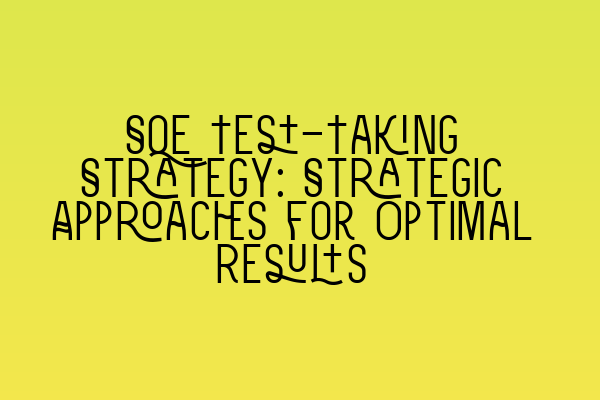SQE Test-Taking Strategy: Strategic Approaches for Optimal Results
Welcome to our blog post on SQE test-taking strategies. If you’re preparing for the Solicitors Qualifying Exam (SQE), you know how crucial it is to have a solid approach to tackle the questions effectively. In this post, we will discuss some strategic approaches that can help you achieve optimal results on the exam.
1. Understanding the Format of the SQE
Before diving into the test-taking strategies, it’s essential to familiarize yourself with the format of the SQE. The exam consists of two stages: SQE1 and SQE2. SQE1 assesses your functioning legal knowledge, while SQE2 tests your practical legal skills.
To succeed in both stages, it’s vital to develop a comprehensive understanding of the exam structure and the types of questions you’ll encounter. This will allow you to identify areas where you need to focus your study efforts and tailor your test-taking strategies accordingly.
2. Time Management
Time management is crucial when taking the SQE. The exam has strict time constraints, and you must allocate your time wisely to answer all the questions within the given time frame.
To effectively manage your time, it’s crucial to practice timed mock tests. Our interactive SQE mock tests for Property are designed to help you sharpen your skills and simulate exam-like conditions. Through consistent practice, you’ll develop a sense of how much time to allocate to each question, allowing you to maximize your performance on the day of the exam.
3. Prioritizing Questions
When tackling the exam, it’s important to prioritize the questions. Start with the questions you feel most confident about and can answer quickly. This will help you gain momentum and build confidence as you progress through the exam. Additionally, it ensures that you don’t get stuck on difficult questions and run out of time for simpler ones.
However, be cautious about spending too much time on a single question. If you find yourself struggling with a particular question, flag it and move on. Once you’ve completed the easier questions, you can return to the flagged questions with a fresh mindset and attempt to answer them.
4. Skimming and Scanning Techniques
Skimming and scanning techniques can be invaluable during the SQE, especially in the time-limited environment. Skimming involves quickly reading through the question and identifying keywords or key phrases. This allows you to understand the main focus of the question without getting caught up in unnecessary details.
Scanning, on the other hand, involves quickly going through the answer options and eliminating obviously incorrect choices. This helps you narrow down the potential correct answer, saving you time and improving your chances of selecting the right option.
5. Practicing Effective Exam Writing
Alongside knowledge and understanding, effective exam writing plays a significant role in achieving optimal results on the SQE. To enhance your exam writing skills, it’s crucial to practice writing answers within the allocated time frame.
During your preparation, consider using our SQE prep tips and resources for success in Property practice. These resources will provide you with valuable insights on how to structure your answers, use appropriate legal terminology, and address the specific requirements of the examiners.
Conclusion
In conclusion, a strategic approach is essential for achieving optimal results on the SQE. By understanding the exam format, managing your time effectively, prioritizing questions, utilizing skimming and scanning techniques, and practicing effective exam writing, you can enhance your performance and increase your chances of success.
For more in-depth information on specific legal topics related to the SQE, we recommend reading our related articles:
- Joint Ownership: Legal Considerations for Co-Owners of Property
- Commercial Leases: Essential Insights for Business Premises
- Tenant Rights in the UK: Understanding Your Legal Protections
We hope these resources will further enhance your SQE preparation and contribute to your overall success on the exam.

Leave a Reply